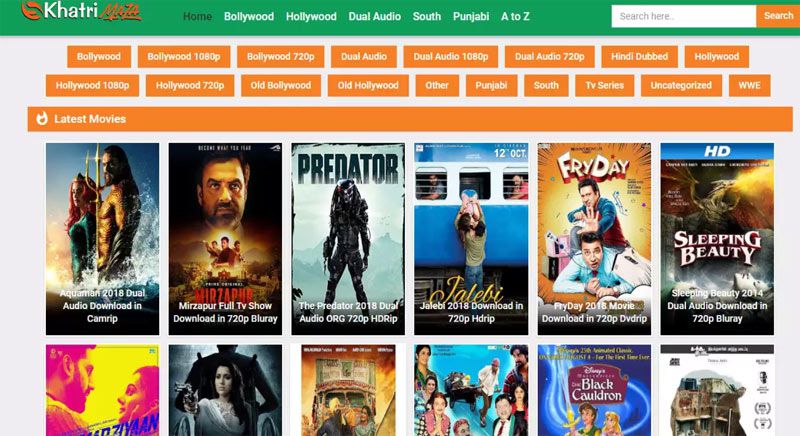Introduction:
In the digital age, accessing entertainment has never been easier. With a myriad of streaming platforms and online services, consumers can enjoy movies, TV shows, and other content with just a few clicks. However, alongside legitimate options, there exists a shadowy world of online piracy. Khatrimaza, a notorious website, has been at the forefront of this illicit activity. In this article, we delve into the world of Khatrimaza, exploring its operations, impact, and controversies.
What is Khatrimaza?
Khatrimaza is a website infamous for providing illegal copies of movies, TV shows, and other entertainment content. Operating in a legal gray area, Khatrimaza allows users to stream or download copyrighted material without authorization from the content creators or rights holders. This practice of piracy undermines the integrity of the entertainment industry and deprives creators of rightful compensation for their work.
How does Khatrimaza work?
Khatrimaza operates through a network of servers and domains, constantly changing to evade legal action. The website typically offers a vast library of content spanning various genres, languages, and release dates. Users can browse the site and select the desired media for streaming or download. The content is often available in different resolutions and formats to accommodate diverse viewing preferences.
Why is Khatrimaza controversial?
Khatrimaza has sparked controversy due to its blatant disregard for copyright laws and intellectual property rights. By illegally distributing copyrighted material, the website undermines the legitimate market for entertainment content and poses significant financial losses to creators, distributors, and other stakeholders. Moreover, Khatrimaza’s operations contribute to the proliferation of piracy, perpetuating a cycle of illegal activity and diminishing incentives for content creation.
What are the legal implications of using Khatrimaza?
Using Khatrimaza or similar piracy websites carries serious legal consequences. Engaging in the unauthorized distribution or consumption of copyrighted material constitutes copyright infringement, a violation of intellectual property laws. Individuals found guilty of piracy may face civil lawsuits, criminal charges, fines, and even imprisonment, depending on the jurisdiction and severity of the offense. Additionally, accessing pirated content exposes users to cybersecurity risks, including malware, viruses, and phishing attacks.
How does Khatrimaza impact the entertainment industry?
Khatrimaza and similar piracy platforms pose a significant threat to the entertainment industry’s economic viability and sustainability. By offering free access to copyrighted content, these websites divert revenue streams away from legitimate distribution channels, such as theaters, streaming services, and DVD sales. This loss of revenue hampers the ability of content creators to fund future projects, innovate, and produce high-quality content. Furthermore, piracy undermines the value of intellectual property rights, discouraging investment in creative endeavors and jeopardizing the livelihoods of artists, filmmakers, actors, and other industry professionals.
What measures are being taken to combat Khatrimaza?
Various measures have been implemented to combat online piracy, including legal action, technological solutions, and industry collaboration. Law enforcement agencies, government authorities, and intellectual property rights holders work together to identify and shut down piracy websites like Khatrimaza. Additionally, advancements in digital rights management (DRM) technologies aim to prevent unauthorized access and distribution of copyrighted material. Furthermore, public awareness campaigns raise awareness about the detrimental effects of piracy and encourage consumers to support legal alternatives for accessing entertainment content.
Conclusion:
Khatrimaza exemplifies the dark side of the digital era, where convenience and accessibility often come at the expense of ethical and legal considerations. As consumers, we must recognize the harm caused by piracy and refrain from supporting illicit platforms like Khatrimaza. Instead, we should prioritize legal means of accessing entertainment content, thereby supporting the creators and preserving the integrity of the entertainment industry. By choosing to respect intellectual property rights, we uphold the values of creativity, innovation, and fair compensation for artists and content creators. Together, we can build a sustainable ecosystem that fosters creativity, rewards talent, and enriches our cultural landscape.

Namaste UI collaborates closely with clients to develop tailored guest posting strategies that align with their unique goals and target audiences. Their commitment to delivering high-quality, niche-specific content ensures that each guest post not only meets but exceeds the expectations of both clients and the hosting platforms. Connect with us on social media for the latest updates on guest posting trends, outreach strategies, and digital marketing tips. For any types of guest posting services, contact us on info[at]namasteui.com.

